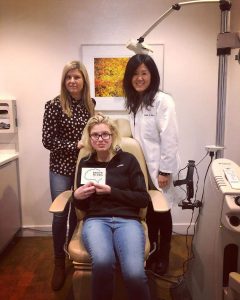Alyssa Carfi had a brainstem cavernoma, a condition where blood vessels are clustered together, and in her case, lodged deep in her brainstem. The condition caused bleeding in her brainstem three times: when she was 12, 15, and 18 years old. On the third occurrence, her doctors knew they had to try to remove it before it caused further damage. Just three days after graduating high school, Alyssa went in for surgery.

Alyssa, standing, with Dr. Michelle Lee, and a PROSE patient who received financial support from Brave Minds.
Based on their location, brainstem cavernomas can cause significant surgical challenges. Alyssa’s cavernoma bled near her 6th and 7th cranial nerves, which affected her right eye and smile. Following her surgery, Alyssa’s right eye rotated in toward her nose, and she had facial paralysis, affecting her eyelid and ability to open and close her right eye. She underwent strabismus surgery to center her eye, and had weights put into her upper lid to help with the closure, but she was still unable to blink, leaving her right eyelid permanently open, day and night. This left her eye exposed to debris, sun, and wind, causing irritation and dryness, and risk of ongoing damage and pain.
For two years, Alyssa used eye drops and serums constantly. She would go through a large box of drops in days. She and her family saw more than 10 doctors at various hospitals and in various states, looking for a better way to live. She had Botox, then her tear ducts plugged, both with the intent to help close her eyelid. Neither worked. One doctor told her to tape her eye shut with gauze and tape.
“An 18-year-old girl doesn’t want to tape one of her eyes shut,” Alyssa says. “And it wasn’t a good long-term solution.”
Her father had been inquiring if a non-prescription contact lens existed that she could wear. But, because Alyssa couldn’t create her own tears in her eye, a soft contact lens would dry out almost immediately. A soft contact also didn’t cover enough of the eye surface to provide the needed protection. It was not an option.
Eventually, after a visit to a pediatric ophthalmologist at NYU’s Langone Health, they were referred to Weill Cornell Medical Center and Dr. Michelle Lee, a BostonSight PROSE™ Fellow and ocular health specialist.
Over a treatment period of six months, Alyssa and Dr. Lee worked on fitting a PROSE device. A PROSE device is a rigid, gas-permeable specialty lens that rests on the sclera of the eye (the white part) and vaults over the cornea. The vaulted reservoir is filled with a preservative-free saline solution, which continually bathes the eye in a tear-like environment to promote comfort, healing, and long-term ocular health. Because of their strong material construction, PROSE devices protect the surface of the eye. They are also highly customizable across eight sections of the lens, are available in a range of sizes, and can include special features such as “channels” grooved into the device to avoid any eye bumps or abnormalities. PROSE devices can also correct near or farsightedness, if needed.
“Every doctor should know about PROSE, from plastic surgeons to eye doctors. My neurosurgeon saved my life, but my plastic surgeons and eye doctors gave my life back. Living with dry eye and not being able to close my eye, no one wants to live like that. My quality of life is so much better. I don’t know how I lived life before PROSE.”
Now a PROSE patient expert after eight years with a device, Alyssa decided she wanted to share her knowledge and support. Approaching her 10-year brainstem surgery anniversary, she realized “how lucky I was. I went to college, studied abroad, have a job in public relations, and I live independently. I know that’s not the case for everyone. I really wanted to take everything my family and I went through to help other people who are experiencing the same thing.”
She launched the Brave Minds Project, a 501(c)(3) nonprofit that supports teen and young adults living with brain and brainstem conditions. The organization aims to help patients and their families from diagnosis through recovery by offering financial support for therapies and off-setting medical costs such as PROSE, providing community connection, and delivering goods that are sent to patients in the hospital and to their siblings.
PROSE treatment gave back to Alyssa the life she wanted – to live like any other young adult her age.
“PROSE is an expensive treatment and it’s not always covered by insurance. But without it, I may have suffered severe dry eye and would have no choice but to get my eye sewn shut. For me, it’s worth it.”
Brave Minds’ goal is to help at least one person per month, regardless of financial status. Last year, Brave Minds paid for an 18-year-old student’s PROSE device.
“I was 15 when my cavernoma was officially diagnosed, and 18 when I had brainstem surgery,” says Alyssa. “This is such a critical time in your life. Your hormones are changing, you’re trying to fit in and discover who you are, and then you learn something is wrong with your brain. It’s a lot to manage and there aren’t many resources for patients this age.”
Braved Minds is based out of New Jersey and supports patients across the country.
To learn more about Alyssa and how you can support the Brave Minds Project go to www.bravemindsproject.org.
Donations to BostonSight for PROSE treatment, which is provided to those in financial need, may be made at www.bostonsight.org/donate.